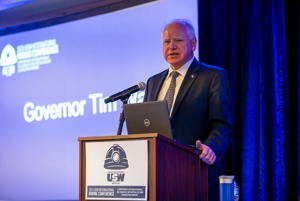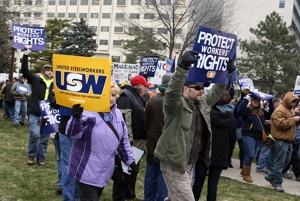With One Case Before State Supreme Court, 2nd IN Judge Rules Right-to-Work Unconstitutional
Following the decision, Indiana Attorney General Greg Zoeller said he would ask for a stay to prevent the decision from immediately taking effect. He also argued that the law’s fate is still truly in the hands of the state Supreme Court. From his statement:
“Strong opinions exist on both sides about involuntary union dues, but the attorney general’s office has a duty to defend the laws the legislature passes from legal challenges plaintiffs file. If a trial court finds a law unconstitutional, then the appropriate action is to stay its ruling pending the appeal.”
The IUOE Local 150 case was originally decided last fall — in favor of the union — by Lake County Superior Court Judge John Sedia. He stayed the verdict to allow it to go to the Supreme Court.
In both rulings judges agreed with the union’s argument that “Right-to-Work” violates the “particular services clause” of the state constitution. That clause states that, “No person’s particular services shall be demanded, without just compensation.” Paras agreed with this argument and wrote a strongly worded opinion that suggests this clause was written specifically to protect workers from laws like “Right-to-Work.”
In his strongly worded decision, the judge said by denying Steelworkers the ability to collect fair-share fees from nonunion members, it is clear the right-to-work law deprives the union of compensation for services it is required by federal law to provide to all employees in a bargaining unit.
“But for the RTW (right-to-work) statute, plaintiffs would still be able to be compensated for such services,” Paras said.
“Moreover, the state of Indiana has taken a central role in the denial of just compensation to plaintiffs, as any violation of the RTW statute by them would bring about their criminal prosecution by the state of Indiana or administrative proceedings against them by the Indiana Department of Labor.”
Paras continued, “The RTW statute eviscerates the basic right that a person be compensated for the good and valuable services that a person provides in commercial endeavors and is the type of law that the particular services clause was intended to bar.”
The ruling by Judge Paras bucks a trend of judges refusing to rule on cases identical to those currently before the Supreme Court. Paras, however, said he believes the state’s highest court was more likely to focus on procedures than questions of constitutionality during their review of Judge Sedia’s case.
***
This has been reposted from We Party Patriots.
By clicking Sign Up you're confirming that you agree with our Terms and Conditions.
Related Blogs
Ready to make a difference?
Are you and your coworkers ready to negotiate together for bigger paychecks, stronger benefits and better lives?

